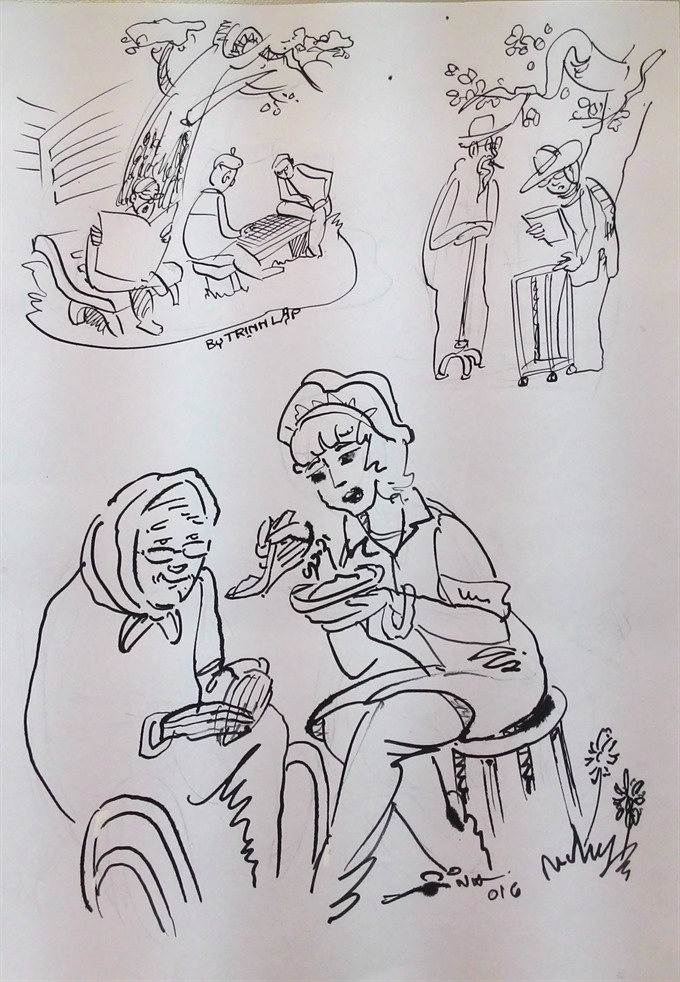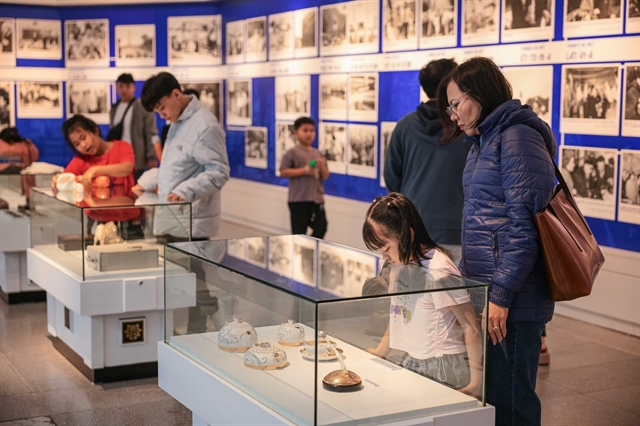 Talk Around Town
Talk Around Town

Old people living at care centres is quite familiar to those in developed countries. However, it’s still controversal in Vietnamese society.
 |
By Minh Thu
Everyday Đặng Thị Hoạch, 80, from Thạch Thất District, enjoys walking and talking with other old people at the Thiên Đức Elderly Care Centre on the outskirts of Hà Nội.
After her husband passed away, she lived with her only daughter and her family. Hoạch’s children and grandchildren were not at home from early in the morning until evening. They hired a housemaid to look after her but Hoạch never felt comfortable. She felt sad and lonely.
One year ago, her children suggested that she can live at a care centre and she agreed.
“Changes are not easy for old people, so it took a time for me to get on well with the new life at the centre,” she said.
“The living conditions and environment here are good. I have friends who are at the same age to talk to. Nurses take care of us kindly from meals to slumbers.”
“My children visit me regularly so I have nothing to complain about. I just come home at Tết (Lunar New Year) and anniversaries. I will live here until the end of my life.”
Hoạch is one among more than 300 people living at the Thiên Đức Centre. Each one has their own story and situation leading them to the centre, far from their family and children.
The centre was founded in 2001 by Dr Nguyễn Tuấn Ngọc.
This is a new model in Việt Nam, and Ngọc faced many obstacles in setting up and running the centre. He consulted several centres in Japan, Germany and the US to build a suitable home for Vietnamese old people.
Most of the people living at the centre have health problems. They suffer common diseases of their age such as heart disease, hypertension, rheumatoid arthritis and the effects of stroke. Many people can no longer walk or eat by themselves. So the attention paid to health care is crucial.
“The team of doctors and nurses check everyone daily and treat them with a combination of both Eastern and Western methods,” said Ngọc. “In particular, besides giving out medicines, we also help them practise physically and use traditional therapies to rehabilitate their health.”
Besides health care, the centre is also concerned about the old people’s spiritual life. There’s a Buddha’s altar for them to pray at and enjoy tranquility everyday. They can also join in the singing, painting, dancing and chess clubs.
“There are various entertainment activities for them because it’s a psychological therapy for old people to integrate into a community, exchange thoughts with each other and relax. All this help prevent depression,” said Ngọc.
Filial respect
Old people living at care centres is quite familiar to those in developed countries. However, it’s still controversal in Vietnamese society. Some say that children who don’t take care of their parents themselves, but leave them at these centres, are not being dutiful.
“I will never send my parents to a nursing home, because old people are emotional and get deep psychological wounds easily,” said Nguyễn Thu Hằng, 35.
“I believe that all old people want to live with their children and family.”
“The saying, ‘One mother can raise ten children, but sometimes ten children cannot take care of one mother’ is right. Children just find an excuse to deny their responsibility. Their excuses are false.”
“Sending them to the care centres is a provisional measure. Children should find ways to overcome their difficulties and take care of their parents, because it’s their obligation and affection.”
Nguyễn Thị Xuyên, 73, confessed that she always misses her children and grandchildren although she lives in the good care of the centre.
“I hang up their photos around the room to relieve my homesick,” she said.
“I prefer living with them, but the fact is that they can’t take care of me all day long, especially when I suffer arthritis and have to move less.”
Vũ Thúy Hằng, 63, a retired woman in Hà Nội, has a 90-year-old father. He had lived at home with a maid, but his children didn’t feel secure. Living at the centre with the health care service from nurses and doctors, he’s getting better.
“I think it’s the best solution,” said Hằng.
“At first my relatives criticised me. They said, ‘You only have one father but you couldn’t take care of him.’ I had to keep explaining that if we kept our parents at home there was no one taking care of them, and it would be dangerous. Gradually, they visited the care centre to see him and realised that he lives in a good situation. Now everyone agrees with my decision.”
“I will also live at a care centre when I get older, because I don’t want to bother my children. I have to save for that from now.”
She plans to write a testament expressing her desire to live at a home for the elderly so her sons won’t suffer the rumours that they don’t care about their mother.
Trần Tuấn, director of the Research and Training Centre for Community Development (RTCCD), said the trend of living at an elderly care centre will become indispensable in the future. More and more centres will be established providing services at different prices to meet the demand.
He emphasised that the authorities should show their concern over these special services and manage these centres well, because not everyone will be able to afford high-end services. They should have a chance to live in State-run centres.
“Living at home or in a care centre depends on the desires of old people,” said Tuấn. “We have to listen to their wishes and respect their decision. They deserve to be loved, cared for and respected.” VNS




